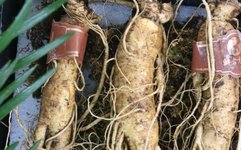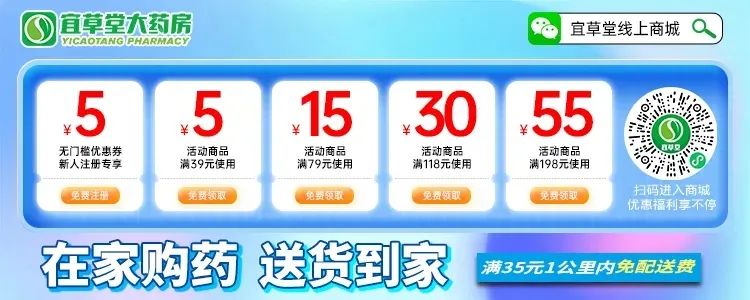
The earliest existing monograph on Chinese medicine, the Shen Nong Ben Cao Jing (Shen Nong’s Classic of Materia Medica), records the essence of ginseng’s medicinal use that was established in China over 4000 years ago: “Ginseng, sweet and slightly cold in nature, primarily nourishes the five organs.”
Effects of Ginseng
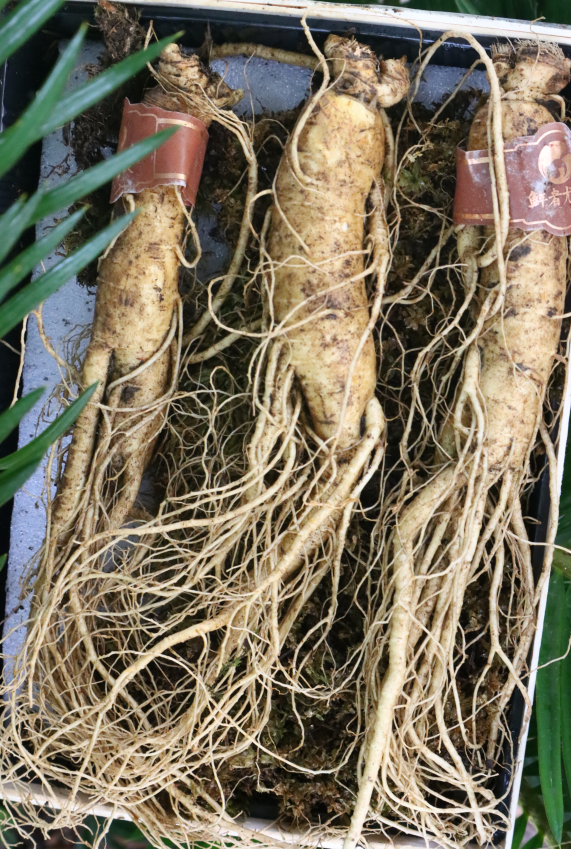
Beauty and Skin Care
The saponins in ginseng can prevent skin dehydration and inhibit the formation of melanin, making the skin smooth, tender, and fair.
Regulating the Central Nervous System
Ginsenosides Rb1 and Rg1 can regulate brain balance, promote the conversion and utilization of energy substances in the brain, calm the mind, enhance memory, prevent insomnia, prevent dementia, treat forgetfulness, and alleviate depression!
Improving Cardiovascular Function
Ginseng has the effect of preventing hypertension and heart disease, and can also regulate blood supply to the heart and brain, preventing strokes, cerebral hemorrhages, and headaches due to insufficient blood supply.
Enhancing Immune Function
1. Ginseng polysaccharides are immune enhancers, regulating those with low immunity and poor resistance;
2. Reducing the toxic side effects of radiotherapy, accelerating the repair of damaged tissues, and prolonging patient survival time;
3. Ginsenosides can enhance anti-stress effects, with the ability to resist hypoxia, and endure high and low temperatures.
Antioxidant Effects
1. Ginsenosides and ginseng polyacetylenes have antioxidant effects, preventing aging in the human body;
2. Ginsenosides can also regulate endocrine and metabolism, protecting the normal function of the five internal organs;
3. Ginseng contains components that promote the growth of red blood cells, maintaining cell vitality, keeping the skin rosy, and enhancing antioxidant capacity.
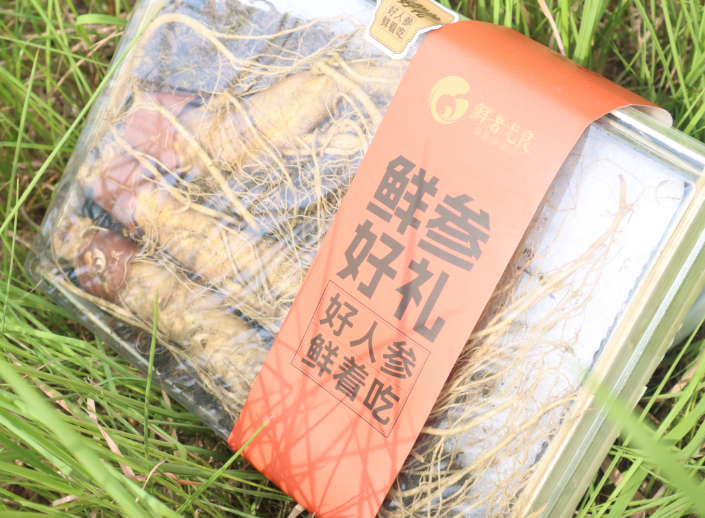
Lowering Blood Lipids and Blood Sugar
Ginsenoside Rb2 can improve blood lipids, lower cholesterol and triglycerides in the blood, increase serum high-density lipoprotein cholesterol, and reduce the atherosclerosis index, making it valuable for treating hyperlipidemia, thrombosis, and atherosclerosis.
Ginseng has a lipid-lowering effect on both healthy individuals and those with hyperlipidemia. It can significantly reduce serum triglycerides in patients with hypertriglyceridemia.
Anti-Tumor Effects
Ginsenosides Rh2, Rh1, Rg3, and Rg5 have certain anti-tumor activities. Ginsenoside Rh2 is the most effective anti-tumor component in ginseng.
Why Eat Fresh Ginseng
Fresh ginseng can enhance the body’s tolerance to cold, heat, and infectious diseases, promoting the regeneration of internal enzymes, and its effects are better than those of dried ginseng. Additionally, there are four more benefits to consuming fresh ginseng.
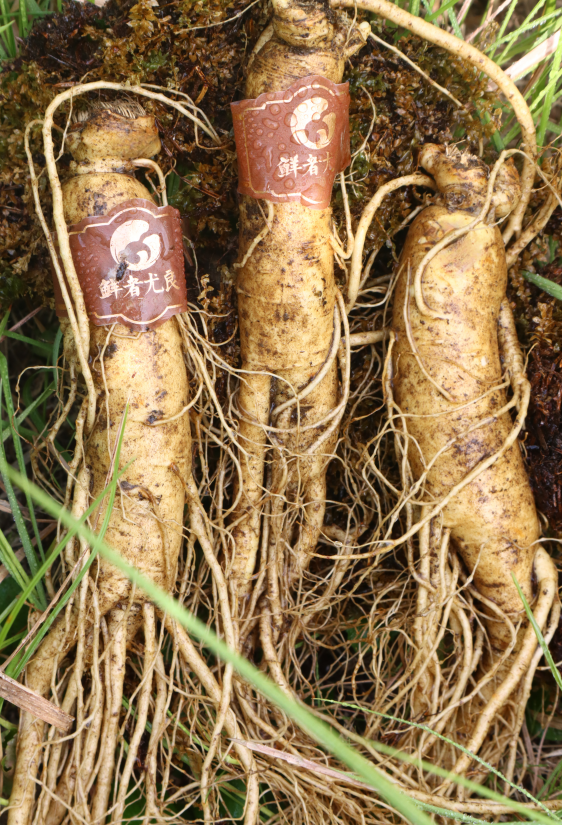
Higher Active Ingredient Content
The total saponin content in fresh ginseng is 27% higher than that in dried ginseng, preserving the natural essence of ginseng (its active ingredients). Besides nourishing and strengthening, it also has a sweet and fragrant taste, making it a great health product.
Fresh Ginseng is Mild and Delicious, Not Heating
The nutritional components of fresh ginseng are balanced. Like other fruits and vegetables, moderate consumption will not cause heat in the consumer.
However, processed ginseng inevitably loses some components during processing, leading to different medicinal properties, which may result in the occurrence of heat symptoms when consumed.
Fresh Ginseng is Easier to Absorb
Fresh ginseng is unprocessed, tender, and juicy, fully retaining the rich nutritional components of its original juice, reflecting a “return to nature”. It not only has a mild cooling property, helping to boost energy, regulate blood circulation, and increase appetite, but the body also absorbs the essence of ginseng more easily, allowing for greater nourishment.
Wide Range of Recipes and Flavors
Fresh ginseng is rich in essence, full of juice, delicious in taste, and has a strong ginseng flavor. It can be used to make various dishes: ginseng porridge, ginseng tea, ginseng soup, fried ginseng, ginseng candied, ginseng egg pancakes, etc., allowing one to enjoy the deliciousness of ginseng while nourishing the body and enhancing resistance.
Suitable Groups for Fresh Ginseng Individuals with Blood Deficiency and Cold Body
Individuals with Blood Deficiency and Cold Body
1. Those who have lost excessive blood due to injury or surgery, postpartum recovery, etc.;
2. Individuals with heavy menstrual bleeding;
3. People with cold hands and feet (especially in winter);
4. Individuals with cold uterus and ovaries.
 High-Stress Individuals
High-Stress Individuals
1. Those with frequent emotional fluctuations, easily experiencing extreme joy or sorrow;
2. Individuals under significant mental stress, overworked, often working overtime or staying up late;
3. People with poor sleep and frequent diarrhea.
 Individuals with Low Immunity and Poor Constitution
Individuals with Low Immunity and Poor Constitution
1. Those who often work on computers;
2. Individuals with significant hair loss;
3. People with skin aging, wrinkles, and spots.
 Individuals with Illness
Individuals with Illness
1. Those prone to varicose veins, rheumatism, low back pain, bone hyperplasia, tinnitus, and hearing loss;
2. Individuals with hypertension, diabetes (ginseng contains no sugar);
3. Patients with spleen and stomach deficiency and cold.
Methods of Consuming Fresh Ginseng
-
Chewing Method
Wash fresh ginseng thoroughly, slice it into 2-3mm thick pieces, and hold it in the mouth until the ginseng flavor diminishes, then chew and swallow.
-
Honey Soaking Method
Wash fresh ginseng, slice it thinly, and soak it in honey for 5 minutes before consuming.
-
Alcohol Soaking Method
Take 2-3 roots of fresh ginseng, wash and drain, and place them in white liquor above 50 degrees Celsius, sealing and soaking for more than 15 days before opening to drink.
-
Soup Stewing Method
Wash the whole fresh ginseng and set aside. Wash a whole fresh chicken (preferably black chicken), place the fresh ginseng inside the chicken’s abdomen, add an appropriate amount of water, and simmer on low heat for 3 hours. Finally, add salt to taste. Drink the soup and eat the meat, and don’t forget to consume the fresh ginseng!
-
Tea Brewing Method
Wash fresh ginseng and slice it thinly, brew it with just boiled water, cover and steep for 3-5 minutes, and it is ready to drink as tea.
 【YICAOTANG TCM Consultation: Zhang Renzhi】YICAOTANG
【YICAOTANG TCM Consultation: Zhang Renzhi】YICAOTANG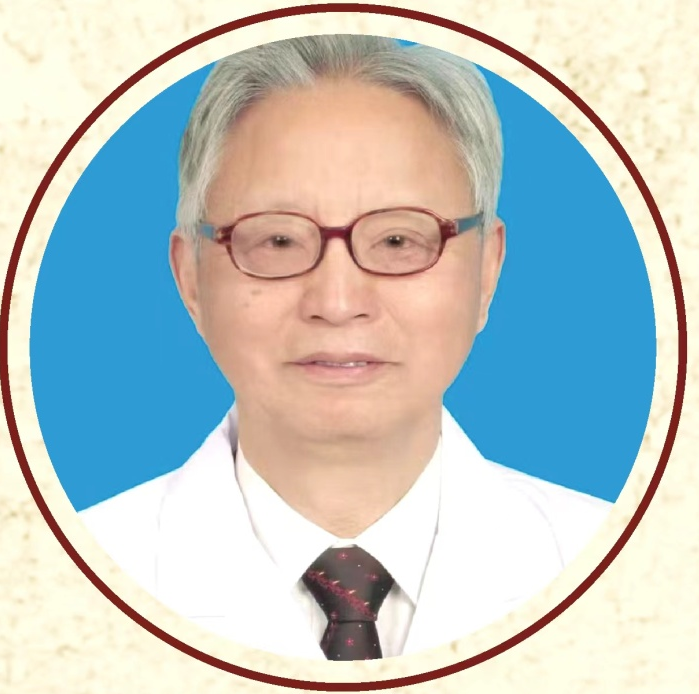
Associate Chief Physician, retired TCM doctor from Gezhouba Central Hospital,who has studied under renowned TCM internal medicine expert Duan Yinglian and gynecology expert Professor Ma Zhi. With over 40 years of dedicated research and long-term practice, integrating Chinese and Western medicine, he has accumulated rich clinical experience.
Specializes incerebral infarction, cerebral hemorrhage, stubborn headaches, dizziness, tinnitus, facial paralysis, toothache, coronary heart disease, rheumatism, gout, liver disease, gastric bleeding, skin diseases, gynecological diseases, pediatric high fever, and asthma and more.
In long-term clinical practice, he has written several papers. Among them, “Discussion on the Differentiation and Treatment of Difficult Diseases” was published in the national journal Chinese Medicine Journal. The article “Treatment of Severe Hepatitis from the Perspective of Dampness” was presented at the 1984 National Hepatitis Conference, and this achievement won the first prize in the Bureau’s Science and Technology Awards in 1984.
Consultation Address: Yicaotang Jinxiu Jiayuan Store
Consultation Hours: Monday to Saturday, 9:00 AM – 11:30 AM
Appointment Phone: 13972604351



Source: Guangdong Traditional Chinese Medicine WeChat Official Account
Some materials are sourced from the internet, and the copyright belongs to the original author; if there is any infringement, please inform us for deletion, thank you!

